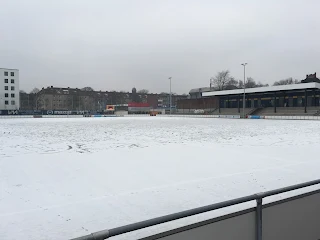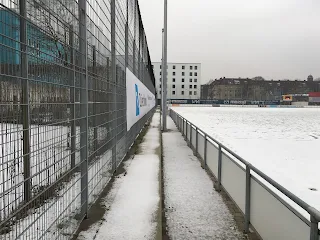On the 10th July 1909, three gymnastic clubs; Barmbeck-Uhlenhorst Turnverein 1876, Männer Turnverein 1888 Barmbeck-Uhlenhorst, and Barmbecker Turnverein 1902 to create Hamburger Turnerschaft Barmbeck-Uhlenhorst 1876. The new club formed a football department in 1911.
The
footballers decided to go their own way in 1923 and founded their own club, playing in local competition with their Wilhelm-Rupprecht-Sportplatz being inaugurated a couple of years later. At the time, the leading nearby amateur side was UCS Paloma. After local football was reclassified in 1928, UB were placed in the Zweitklassigkeit, Hamburg's second tier.
In 1943, a merger with Post SG Hamburg was arranged to form Kriegspielgemeinschaft Post/BU Hamburg. This was added to by SV St. Georg and SC Sperber Hamburg to form KSG Alsterdorf. T side competed in the 1944-45 campaign in the Gauliga Hamburg, one of sixteen top-flight divisions created under the rule of the Third Reich.
A rebrand, together with a merger with FC Rot-Weiß Hamburg 1923, led to the title of HSV Barmbek-Uhlenhorst being adopted before HSV Barmbek-Uhlenhorst 1923, which came into being in 1954. The change paid off as the team won promotion to the Verbandsliga the following season, where they ended runners-up in 1959-60 and 1960-61.
Promotion to the Landesliga Hamburg was achieved in 1961-62 as a crowd of 6,000 attended the playoff win against UCS Paloma. As Hamburg amateur champions, BU qualified for the playoffs to reach Regionalliga Nord, which was achieved following a 3-1 victory against Leu Braunschweig to reach the second tier of German football.
A season later, BU were relegated. However, with trainer Edu Preuß at the helm, the club went back up in 1965-66 as champions of the Hamburg Landesliga. The large youth development, with up to thirty teams representing the club, played a major part in its success, being ranked at the time as the third biggest in Hamburg, behind Hamburger SV and St Pauli.
The club remained as a second-tier side for the next eight years. Sperber-Platz in Alsterdorf was used for home games for a while as their stadium was renovated. Former German international Willi Giesemann signed for BU in 1968, as the side went on to finish fifth in 1970-71 as dreams of Bundesliga football were in the air.
Reinhold Ertel took over as coach as star player Klaus Fock moved to Belgian first division club KFC Beringen for a record transfer fee of 150,000 DM. A fourth-place finish was collected in 1971-72, but despite the consistency, spectator interest was on the wane. German
football was restructured in 1974.
Barmbek-Uhlenhorst accepted the invitation to join the newly formed 2. Bundesliga Nord, going down after just one season. It was tough as the club could not play at their own ground on Steilshooper Straße as it didn't meet requirements, having instead to play in Rothenbaum, 8km away. A 1-0 win against Borussia Dortmund proved to be scant consolation.
BU accrued a debt of more than 500,000 DM. Cash was raised through a friendly against HSV, while the Ernst Deutsch Theatre donated the proceeds from two performances, and as a climax, 10,000 LPs of Stars Sing were produced for BU, as many people rallied around to keep the club afloat.
The club began to slide, with a season in the Oberliga being managed by Bernd Brehme, finishing fifth in 1977-78. The
club were sent down to the Amateuroberliga Nord, from where they were
relegated to the Verbandsliga Hamburg in 1979-80, with a young Andreas Brehme
starting his illustrious career with the team as Ulrich Schulz took over as trainer.
The clubs’
fall from grace continued as a further relegation was suffered in 1981-82 as Barmbek-Uhlenhorst
went down to the Landesliga Hamburg-Hansa, before slipping further to the sixth
tier Bezirksliga Hamburg-Nord in 1983-84. Plans were also in place to build apartments on the municipal site of the pitch on Steilshooper Straße to add to the problems.
The Berzirksliga title was lifted in 1985-86 as BU played out the following few seasons in the fourth and fifth tiers, before finding themselves back at the sixth level when the Landesliga Hamburg-Hansa became that level in 1994.
The Berzirksliga title was lifted in 1985-86 as BU played out the following few seasons in the fourth and fifth tiers, before finding themselves back at the sixth level when the Landesliga Hamburg-Hansa became that level in 1994.
In 1998-99, the club won promotion to the Verbandsliga Hamburg, and then went up a further
notch to the fourth-tier Oberliga Nord in 2003-04. However, BU’s spell lasted
just one season before they returned to the Verbandsliga. A further
restructuring of the German football league system saw the fifth tier become
the Oberliga
Hamburg.
Wilhelm-Rupprecht-Platz on Steilshooper Straße was demolished in 2015, with the Dieselstraße Stadium near Habichtstraße U-Bahn station being opened a year later. Barmbek-Uhlenhorst continued to play in Oberliga Nord, where a runners-up spot
in 2015-16 was followed up by eighth place in 2017-18 under manager Peter
Martens.
The
performance was improved upon with sixth place in 2018-19, thanks in part to the
strike partnership of Abdel Aziz Hathat and Janis Korczanowski under coach
Marco Stier. BU were in third place when the 2019-20 season ended early with Tim
Jeske getting in on the goalscoring act. Jan Haimerl was appointed as trainer in the summer of 2020.
He was replaced by Michael Koss, whose side finished fourth in 2022-23 in the sixth-tier Landesliga Hammonia after the German league system was restructured, which was replicated twelve months later.
HSV Barmbek-Uhlenhorst will play in Landesliga Hammonia in the 2025-26 season.
My visit
My wonderful
week-long football tour was just a few hours from over. I’d visited grounds and
seen games in the north of England and all across Germany. Just before I headed
to the airport in Hamburg, I had time for one last stop.
After
alighting at Habichtstraße station, I wandered along the main road before taking
the first left up Dieselstrasse, where the venue opened up on the left before
the railway embankment. I negotiated the snow-covered path to the entrance.
Unfortunately, the ground was locked, but that was no problem as the north end was enclosed by
a wire fence, so I could still take photos without any trouble.
Stadion an der Dieselstraße was a fine modern venue, with a neat covered Main Stand on one side flanked by
open terracing. The other three sides had a small strip of open flat standing
around the artificial playing surface.
Happy with
my work, I headed back to Barmbek station to grab some food and water at far
better value than the airport would be offering. The train took me to my
terminal in bags of time before my return flight back to Heathrow after a
superb break.












No comments:
Post a Comment